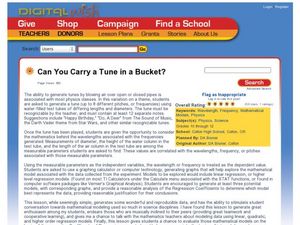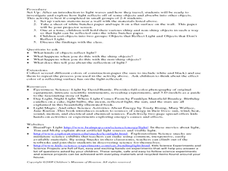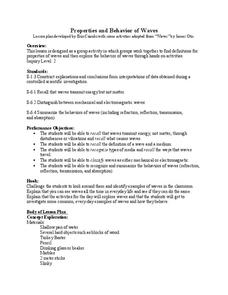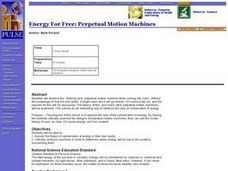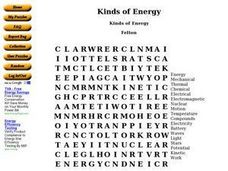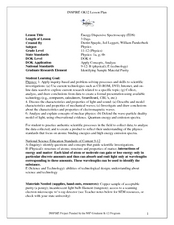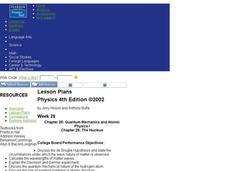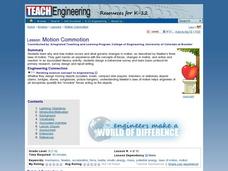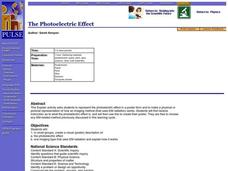Curated OER
Can You Carry a Tune in a Bucket?
Young scholars use water filled pipes to play a tune and consider the mathematics behind the sound waves. In this sound wave instructional activity, students play a tune with water filled pipes. They create a mathematical model to...
Curated OER
Light Reflections
Students explore light. In this physical science light instructional activity, students display objects on a projection screen and investigate how light absorbs, refracts, transmits and reflects. Students discuss common features of...
Curated OER
Woodwind Instruments and Pitch
Students explore musical pitch. In this cross curriculum musical instruments and "sound" physics instructional activity, students identify and describe common traits of woodwind instruments. Students research "pitch" and what causes...
Curated OER
The Physics of Hummingbirds: Magic in the Air
Young scholars study hummingbirds and how they use Newton's law. In this motion activity students complete several activities and view videos of hummingbirds.
Curated OER
Properties and Behavior of Waves
Students explore the different properties of waves. In this physics lesson, students differentiate mechanical and electromagnetic waves. They explore each lab station and write their observation about the wave behavior they see.
Curated OER
Energy: Classroom Energy Hunt
Sixth graders list the different forms of energy. In this physics lesson, 6th graders identify what form of energy a certain object possess. They explain the law of conservation of energy.
Curated OER
Energy for Free: Perpetual Motion Machines
Students observe the "drinking bird" perpetual motion machine and critically examine the designs of other so-called perpetual motion machines. They use this experience to create their own definition of conservation of energy.
Curated OER
Kinds of Energy Word Search
In this energy word search puzzle, middle schoolers identify types of energy and related terms. They identify 18 words from a given list. An answer sheet is provided.
University of Colorado
The Jovian Basketball Hoop
A radio receives radio signals, converts them to an electrical signal, then converts this signal to a sound signal, and amplifies the sound so people can hear it. Class members use this information to create a short-wave radio antenna...
University of Colorado
The Jovian Basketball Hoop
Can you listen to Jupiter on a simple radio? Turns out the answer is yes! The resource instructs scholars to build a simple radio to pick up the radio waves created when the charged particles from the sun hit Jupiter's magnetic...
Cornell University
Sound Off!
Time to witness the effects of sound. Learners analyze different materials to determine their abilities to absorb sound waves. They use free software to monitor the amplitude of the waves to verify results.
PHET
Band Structure
Electricity travels at the speed of light, 186,000 miles per second. Through a simulation, classes see how the structure of energy bands in crystals of atoms determines how materials conduct electricity. Participants can change the...
Curated OER
Hear the Wave!
Students study sound and ear function. In this sound functions activity, students investigate soundwaves by completing various experiments. Students participate in a number of sound stations and complete the comparison chart with their...
Curated OER
Energy Dispersive Spectroscopy
Young scholars calculate the values of electron binding energies. In this physics lesson, students solve for different wavelength characteristics of X-rays. They present their findings to the class.
Curated OER
Quantum Mechanics and Atomic Physics
Students will discuss the de Brogile Hypothesis and state the circumstances under which the wave nature of matter is observed. They will also calculate the wavelengths of matter waves.
Curated OER
Potato Launcher Energy Lab
Students investigate conservation laws using a potato launcher. In this physics lesson, students measure angles, time and distance of the potato. They discuss applications of experiments like this.
Curated OER
Energy Defined
Fourth graders complete activities to study the sources of energy and forms. In this energy activity, 4th graders discuss the origin of energy and define it. Students participate in several experiments to further study energy including a...
Colorado State University
What's the Difference Between Blue Light and Red Light?
Finally, an electromagnetic spectrum lab that will get glowing reviews from your class! Explore the nature of light using red and blue LED sources and fantastic phosphorescent paper. Young scientists compare the effects of blue light...
Curated OER
Motion Commotion!
Students explore the drawings of Rube Goldberg to design and construct a simple machine. They discuss simple machines, and using various materials and toy parts, design and construct a "Rube Goldberg" style machine to ring a bell.
It's About Time
AC and DC Currents
An informative physics lesson includes two teacher demonstrations, one on AC currents and the other on DC currents, allowing pupils to take notes while watching. The resource includes questions to assign as homework or...
Weebly
Definitions of Conduction, Convection, and Radiation
There's quite a bit in this physical science packet. First, how is heat transferred? Learners read a brief explanation of conduction, convection, and radiation before identifying common occurrences (with pictures) as one of the three....
Curated OER
Why Be Active?
What are some of the benefits of physical activity? Young learners take a look at not just the physical benefits, but also the emotional and social benefits of being physically active. There is a heart rate activity to count their...
Curated OER
The Photoelectric Effect
After some online instruction, chemistry aces use their creative abilities to produce a poster describing the photoelectric effect and one type of imaging technology that uses electromagnetic radiation. This simple, straightforward...
Curated OER
Science Crossword Puzzle
Class members read 25 clues about all areas of science, including biology, chemistry, weather, physical science, and insert their answers into a crossword puzzle. There is no word bank and the students would need experience with tough...


